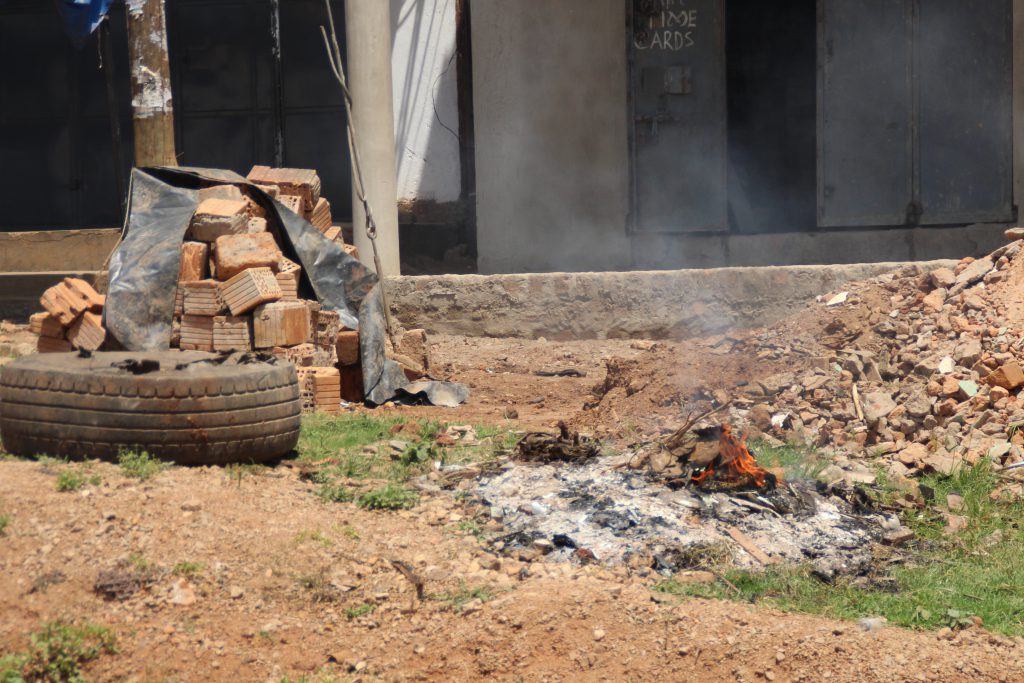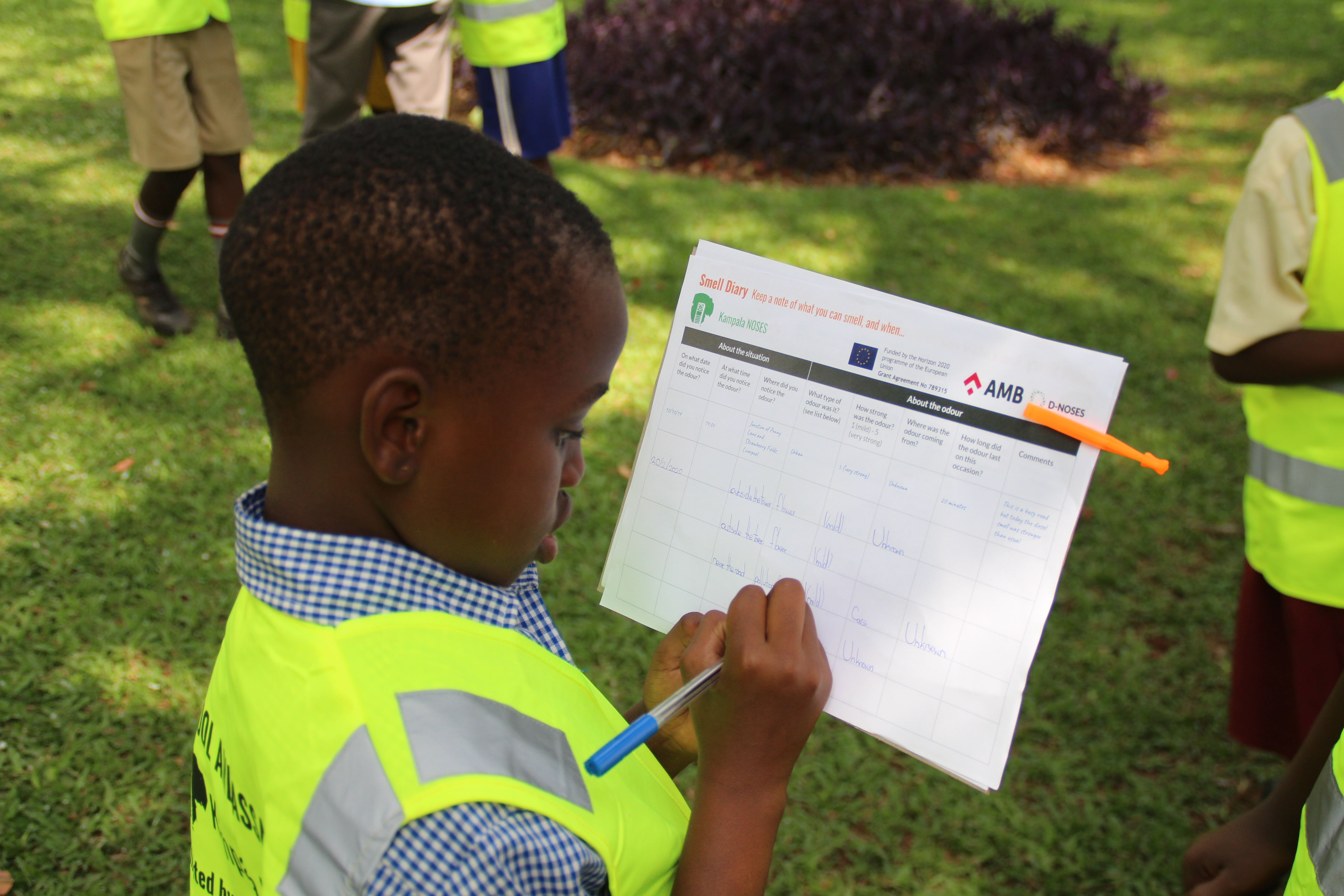Novel ways to monitor and record odour issues across Kampala, Uganda
Summary of pilot
Co-funded by Àrea Metropolitana de Barcelona, ‘Kampala NOSES’ is a pilot that seeks to introduce novel ways with which to monitor and record odour issues across Kampala, with a longer-term vision of implementing new environmental reporting and governance mechanisms that are accessible to all, irrespective of literacy level, age or gender.
The situation
In Kampala, efforts to manage waste in the city are continuously overwhelmed by the ever-increasing population of city residents, increased levels of economic activity, and reduced funding from central government. Citizens complaints about odour nuisance are present in the local media and authorities lack a monitoring system with which to systematically record and ultimately improve the situation.
D-Noses role and aims
Using a highly inclusive approach, the project aims to empower children and women through science education and to increase the capacities of city officers to improve odour pollution monitoring in Kampala using citizen science. A school programme will run until Oct 2020 to educate children about odour pollution monitoring who will design and deploy an awareness raising campaign in local markets during August. At the same time, the city officers will build capacity in odour pollution management through collaboration with odour experts within D-NOSES consortium.
Progress so far
We have been working with the schools since February 2020. After a face-to-face session in Kampala, the students followed the schools programme in the class for a few weeks until COVID hit. During the lockdown, we managed to distribute activities to the ambassador students so they could continue the programme individually. In February 2021 the schools resumed and the teachers and students were able to finalise the programme, gathering qualitative and quantitative odour data from their communities and Kampala markets. Initial results indicate a variety of odour issues related to mismanagement of waste and illegal dumping, among others.
To identify the main sources of odours in Kampala markets as well as the perceptions from the vendors, we designed a questionnaire to gather qualitative and quantitative data. Interviews done between October 2020 and February 2021 identified issues related to the lack of awareness about “odour pollution” and to the inconsistent collection of rubbish, which causes nuisance to both vendors and clients. Additional stakeholders were interviewed to get a better understanding of the situation, including waste managers, responsible for a landfill and informal workers. The main findings were shared with AMB and KCCA during a stakeholder session on 27th April 2021. A range of strategies to improve the waste management in the city were discussed and considered.
Co-funded by Àrea Metropolitana de Barcelona, ‘Kampala NOSES’ is a pilot that seeks to introduce novel ways with which to monitor and record odour issues across Kampala, with a longer-term vision of implementing new environmental reporting and governance mechanisms that are accessible to all, irrespective of literacy level, age or gender.
The situation
In Kampala, efforts to manage waste in the city are continuously overwhelmed by the ever-increasing population of city residents, increased levels of economic activity, and reduced funding from central government. Citizens complaints about odour nuisance are present in the local media and authorities lack a monitoring system with which to systematically record and ultimately improve the situation.
D-Noses role and aims
Using a highly inclusive approach, the project aims to empower children and women through science education and to increase the capacities of city officers to improve odour pollution monitoring in Kampala using citizen science. A school programme will run until Oct 2020 to educate children about odour pollution monitoring who will design and deploy an awareness raising campaign in local markets during August. At the same time, the city officers will build capacity in odour pollution management through collaboration with odour experts within D-NOSES consortium.
Progress so far
We have been working with the schools since February 2020. After a face-to-face session in Kampala, the students followed the schools programme in the class for a few weeks until COVID hit. During the lockdown, we managed to distribute activities to the ambassador students so they could continue the programme individually. In February 2021 the schools resumed and the teachers and students were able to finalise the programme, gathering qualitative and quantitative odour data from their communities and Kampala markets. Initial results indicate a variety of odour issues related to mismanagement of waste and illegal dumping, among others.
To identify the main sources of odours in Kampala markets as well as the perceptions from the vendors, we designed a questionnaire to gather qualitative and quantitative data. Interviews done between October 2020 and February 2021 identified issues related to the lack of awareness about “odour pollution” and to the inconsistent collection of rubbish, which causes nuisance to both vendors and clients. Additional stakeholders were interviewed to get a better understanding of the situation, including waste managers, responsible for a landfill and informal workers. The main findings were shared with AMB and KCCA during a stakeholder session on 27th April 2021. A range of strategies to improve the waste management in the city were discussed and considered.

Household waste is frequently burned across the city

Student recording odours in a smell diary

Students from Nakasero Primary School meet local project coordinator, Bernadetter, after months without lesson. They are holding the first 2 odour-related activities that they completed remotely since November.
